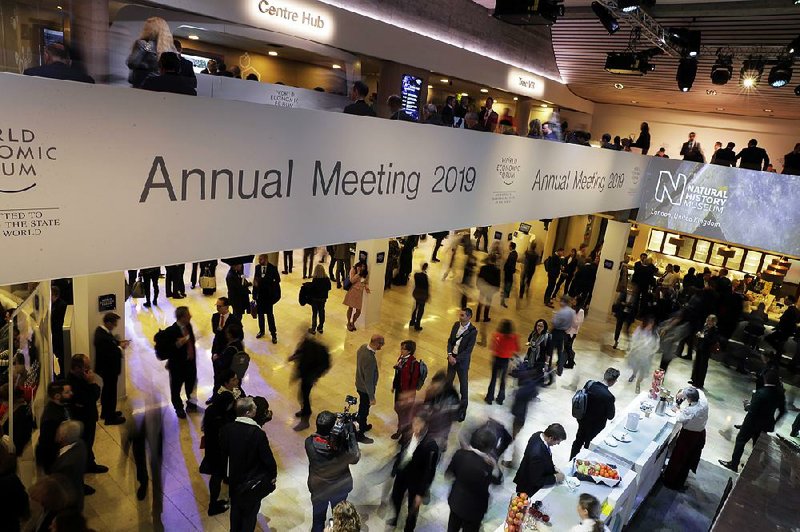DAVOS, Switzerland -- World leaders in favor of international cooperation and free trade struck back Wednesday against the wave of populist nationalism that has featured more prominently than usual at the World Economic Forum in Davos, Switzerland.
As a wide array of heads of state -- from Poland to Colombia to Rwanda -- addressed the political and business leaders, the question of global cooperation emerged as a dividing line. The leaders of Japan and Germany -- countries that have flourished on trade since their devastation under nationalist leaders in World War II -- focused on the need for cooperation.
It was a not-so-subtle dig at earlier speeches by the populist president of Brazil and U.S. Secretary of State Mike Pompeo, who said governments should focus more on national self-interest over international rules.
"I believe that it's worth bringing together like-minded people around the world, because anything else will lead us into despair," said German Chancellor Angela Merkel.
She said efforts to combat global problems -- from an economic slowdown to tensions over trade, the United Kingdom's exit from the European Union and migration -- "will only function if we are able to compromise."
She cited as a positive example a free-trade deal between the EU and Japan that will take effect Feb. 1.
Japan's prime minister, Shinzo Abe, put a similarly strong focus on working together, noting another trade deal, among Pacific Rim countries.
He warned, however, that there are risks.
"U.S.-China trade friction is one of those risks and Japan traditionally has said tit-for-tat trade-restrictive measures are of no benefit," he said in his first appearance in Davos in five years.
The U.S. and China, the world's two biggest economies, are locked in a major trade dispute and have put tariffs on hundreds of billions of dollars' worth of traded goods.
The administration of U.S. President Donald Trump says China is not being transparent on government subsidies it gives Chinese companies and is swiping intellectual property from Western firms.
While Abe and Merkel squarely warned against taking punitive measures in the way that Trump has -- without going through international institutions such as the World Trade Organization to settle disputes -- both Japan and European countries have also complained about China.
For all the focus on Trump, there are plenty of signs, too, of a growing skepticism toward China, which has done little to build its case as a defender of the global order since President Xi Jinping used an appearance at Davos in 2017 to try to claim that mantle.
In a veiled swipe at Beijing, Abe used his speech to call for change at the World Trade Organization, especially in its rules on government subsidies. Japan has been working with the European Union and the U.S. on a plan to update the rules for industrial subsidies in particular, which many countries believe China has used unfairly to build its economy and introduce a new herd of state-backed corporate giants into the global economy in recent decades.
"Major changes are taking place and the WTO is behind the curve -- it's not keeping up with pace," Abe said in a brief question-and-answer session. "We need to reform it."
Efforts were underway to defuse the U.S.-China dispute, with a high-level Chinese delegation expected to visit Washington next week.
The level of tensions remained intense, however.
China's vice president used his own speech in Davos to take shots at Trump and his administration.
"Shifting blame for one's own problems onto others will not resolve the problems," said Wang Qishan.
He sought to cast China as a proponent of open markets though, in reality, it keeps tight control of its access to foreign investors and companies.
"What we need to do is make the pie bigger while looking for ways to share it in a more equitable way," he said. "The last thing we should do is to stop making the pie and just engage in a futile debate on how to divide it."
But at a dinner Tuesday with Xiao Yaqing, chairman of the state-owned Assets Supervision and Administration Commission, foreign executives from more than 20 global companies including HSBC Holdings PLC, JPMorgan Chase & Co. and Siemens AG raised concerns about China's treatment of intellectual property and the Made in China 2025 policy that envisions the nation leading the world in industries such as robotics.
Trump had intended to visit Davos with a big delegation to meet with the Chinese over the trade issues. They canceled the trip, however, because of the U.S. government shutdown. Other major leaders have also had to cancel their trips, including those of Britain and France to deal with the U.K's split from the EU and popular protests.
The uncertainty over the British move also featured heavily in talks in Davos as a major risk to global commerce and cooperation.
British lawmakers last week voted down Prime Minister Theresa May's deal with the European Union. Since then, speculation has risen that Britain could crash out of the bloc without a deal or end up extending its date of departure from the current March 29.
Merkel said she is working for a "well-ordered" exit and is looking for a "good" future partnership with Britain not just on trade but on issues such as security and defense.
Information for this article was contributed by Jamey Keaten, Paul Wiseman, Pan Pylas and David McHugh of The Associated Press; and by Shawn Donnan, John Micklethwait, Stuart Biggs, Jun Luo, Isabel Reynolds and Chris Reiter of Bloomberg News.
Business on 01/24/2019
